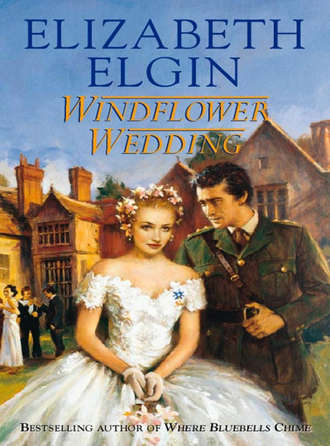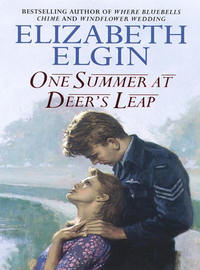
Полная версия
Windflower Wedding
‘I know. And I liked her a lot. If Kitty hadn’t happened along, I should think the three of us would still be going out together every time we dock.’
‘You’re missing Kitty, aren’t you? Poor love – I do know how it is. But London isn’t Washington. You’ll see her soon.’
‘On my next long leave, I suppose. Hope she can get time off. I’ll go to London if she can’t, though I’d rather go home to Rowangarth. I miss it, Daiz.’
‘Well, you can’t have it all ways! And surely ENSA will give Kitty leave? After all, you’ve got a wedding to arrange. But it’s Lyn you want to talk about, isn’t it? And you’d best be sharp; I’ll have to be in, soon.’
‘How is she, Daiz? I’m not so big-headed as to think she’ll have gone into purdah over me when she could have any bloke she wanted.’
‘Except Drew Sutton.’ Daisy set her mouth button-round.
‘I’m sorry about that. The Rowangarth Suttons seem good at it – falling heavily and suddenly, I mean.’
‘And what would have happened if Kitty hadn’t come along? Be honest, Drew.’
‘It would have been Lyn, I’m almost sure. There was something holding me back, though.’
‘Someone called Kitty. And Lyn didn’t just like you, Drew. She was mad about you. I think she still is, though she’s getting good at pretending she isn’t.’
‘I wouldn’t have hurt her, Daiz. Not for anything.’
‘You mean you wouldn’t have deliberately hurt her? I know that, but you did, Drew, and there’s nothing anyone can do about it.’
‘You can be quite bossy when you set your mind to it!’
‘Sister’s privilege. And I’m as sad about it as Lyn is because I like Lyn and Kitty – and you, too, you great soft ha’p’orth. I’m piggy-in-the-middle, I suppose. But c’mon, bruv; give me a hug and a kiss.’
‘I’ve enjoyed tonight.’ He circled her in his arms, laying his cheek on hers. ‘Take care of yourself. See you.’
‘You too, Drew Sutton. When are you sailing?’
‘Morning tide. And remember to say hi to Keth for me, next time you write.’
‘I’ll do that. Careful how you go, sailor. Be lucky.’
She stood at the gate of Hellas House until he rounded the corner. He didn’t turn and wave. Sailors never did. They never said goodbye either.
Her eyes filled with tears; not for Drew nor Lyn nor Kitty but for herself, because she loved Keth so much and wanted him so desperately.
Take care of Keth, won’t you – and Drew? she pleaded silently. And God – when is this war going to end?
‘I really must get this lot cut.’ Tatiana wound strands of hair round her finger, pinning them flat to her head. ‘Yours suits you short, Kitty.’
‘Mm. Easy to look after, too. When you’re out on the road there never seems to be a hairdresser around.’
‘That’s because a lot of them have been called up,’ Tatiana laughed. ‘Shampooing hair isn’t regarded as war work exactly!’
‘Guess you’re right.’ Sighing deeply, Kitty lay back on her bed, hands behind head. ‘We’re going to Norfolk tomorrow, doing a show for the Air Force, there. Then after that we’ll be in Scotland. Some godforsaken place called Scapa.’
‘Scapa Flow. We’ve got a lot of ships, there.’
‘But not a minesweeper called HMS Penrose. Oh heck, Tatty! I’m sorry! I shouldn’t have said that. I’ve been trying like mad not to mention Drew. You know I wouldn’t hurt you for all the world, don’t you?’
‘I know. And, Kitty – I want you to talk about Drew. I don’t know how you can not talk about him. I used to talk to Daisy and Gracie all the time about Tim. They’d alibi me so I could meet him, you see.’
‘Y’mean you never took Tim home? Why ever not?’
‘Because Mother was like that. I suppose it’s the Russian in her; overprotective. And as for the Petrovska! Well, only a Romanov would have been good enough for me – if they’d never left St Petersburg, that is, and if that rabble hadn’t murdered the Czar-God-rest-him.’ She crossed herself devoutly, fluttering her eyelids, mimicking her grandmother. ‘But I wanted Tim the minute I saw him.’
‘Guess it was like that for Drew and me too. We’d grown up together – well, twice a year together, kind of – and then, after five years we meet at a crummy dockyard concert and Wham! Both of us! Suppose I realized it first. Drew was mad at me for showing too much. But what the heck – I was wearing a borrowed costume!
‘Guess there was a lot of me oozing out,’ she giggled, ‘but the other sailors just loved it! Drew was real mad at me, though, and said I was common, so I said I was sorry and all at once it came right.’
‘And was it marvellous, like for me and Tim?’
‘We-e-ll, Drew was a bit sniffy, but it was only because he didn’t like those sailors ogling me. In the end we went back to my digs. That was when we decided we’d fallen in love.’
‘And you stayed together all night?’
‘All night!’
‘Wish Tim and me could have.’
‘Poor Tatty. You never – not once?’
‘Yes, but not all night. I told him I loved him, but in Russian at first. Then we got to talking about me being too young to marry him and him thinking he mightn’t live long enough to wait for me – tail-gunners take a lot of flack, you know. Anyway, we decided it was going to happen between us and Tim said that when it did I wasn’t to worry. I wouldn’t have cared if I’d got pregnant though I suppose now it’s best I didn’t. When Tim was – was killed, my period was five days late, but it didn’t seem to register. I was too numb.’
‘You’d have been just fine, Tatty. The Clan would’ve stood by you.’
‘I know that. But imagine Mother trying to hide the shame of it in Holdenby – and as for Grandmother Petrovska! She’d have had me whipped! But Aunt Julia and Uncle Nathan would have been all right about it – I know they would. And I could have kept the baby. Grandfather Sutton left me Denniston House and some money, too.’
‘We were all very sad about Grandfather. When Aunt Julia wrote to tell us we just couldn’t believe it. Not so suddenly and cruelly, I mean. And we couldn’t get across for the funeral either. Pa was real cut up about it.’
‘Tim died the same night; probably about the same time, though it wasn’t Tim’s bomber that crashed on the village. It came down on the pike. I wish I knew how to ill-wish, Kitty. Those German pilots who shot up the aerodrome that night would be dead now if I could do it. D’you think I’m peculiar?’
‘Of course I don’t!’
‘The Petrovska thinks I am. She doesn’t like my Englishness. Uncle Igor is the better for knowing, though. We’ve got quite close lately. He told me things …’
‘What things?’ Kitty’s eyes sparked.
‘Oh, nothing like that!’ If only I could tell you, Kitty. If only I could tell anyone! ‘He told me things about living in St Petersburg before the revolution and the way life used to be for the rich. Sometimes I’m glad the Bolsheviks kicked them out!’
‘I reckon they call them Commies now,’ Kitty offered.
‘I know. But she still calls them Bolsheviks; the rabble, the great unwashed! I’m glad my mother married an Englishman, even though she wasn’t happy with him.’
‘She wasn’t?’ Kitty breathed. ‘Ooooh! Do tell.’
‘No! I mean – there’s nothing to tell. Not actually.’ Hell, she’d nearly let it slip! ‘What I meant was that she must have been unhappy, starting four babies and only me living. And it must have been awful, having Grandmother Clementina for a mother-in-law.’ Her cheeks burned. She must watch her tongue, in future! ‘But I don’t want to talk about them. Let’s talk about us and how glad I am you’re here, Kitty. It’s a shame you won’t be able to meet my airmen just yet.’
‘Your wounded pilots, you mean – the ones you take out?’
‘My burned aircrew, poor brave loves. Sam is getting over it a bit. He’s going to have hospital treatment soon; see if they can make him a new nose, he says – a better one.’
‘And the other one, Tatty?’
‘The other one – Bill – is the reason I can bear to talk about Tim; the reason why seeing you so happy with Drew doesn’t make me want to end it all.’
‘End it all! Gee, Tatty, don’t ever think of that!’
‘I wanted to, once. When I knew Tim really wasn’t coming back and after I realized I wasn’t going to have his baby. If there’d been a pill I could have swallowed – something not painful – I’d have taken it.
‘But now there’s Bill. I’m not in love with him – it’s nothing like that. But when I’m with him I can pretend he’s Tim. Bill’s got no features, really, and he was blinded. But his hair is like Tim’s hair and his accent, too. And he’s an air-gunner like Tim was.’
‘You mean that when you’re with him,’ Kitty breathed, ‘you act out a fantasy? Bill is Tim, really – is that what you’re trying to say? But, Tatty, that isn’t fair! Not to you nor to Bill! What if he falls in love with you? Or what if you fall in love with him?’
‘So you do think I’m peculiar? I knew you did!’
‘No I don’t, Tatty! I truly don’t! But what if your Bill is married, eh?’
‘He isn’t. He told me so. He hasn’t got parents, even. He’s got no one in the entire world! And now he’s blind! Well, at least he can’t see his poor face!’
Tears filled her eyes, then ran unchecked down her cheeks and Kitty was at her side in an instant, holding her tightly, rocking her, hushing her.
‘Don’t cry. Please don’t cry, Tatty. Heck, if only I could do something – anything! I can’t bear to see you like this! Please, honey, don’t upset yourself.’
‘I’m not upset. And I was fine till I told you. My own fault, I suppose, for even allowing myself to think Bill could be Tim. I tell myself that Tim is dead, but the minute I see Bill, hear his voice, take his arm – because he can’t see, so I have to – then it’s Tim I’m with. But sometimes I want him so much, Kitty, I feel real pain! He isn’t a prisoner of war, or even missing. He’s dead! It’s so cruel and uncaring and – and final!’
‘Tatty, what am I to say to you? There’s nothing I can do to help. I’d do it if I could. But if you want to go on with your fantasies, then I hope I’m there for you when the bubble bursts and you have to accept it isn’t Tim.’
Now Kitty was weeping but for whom she did not know. For Tatty, was it, and Tatty’s tearing grief? Or was it for herself, because she was too happy and couldn’t even begin to imagine how it would be if one day a telegram came to Rowangarth and Aunt Julia had to tell her? Oh, please not Drew.
They held each other tightly, then Tatiana pulled away, sniffing loudly.
‘You look a mess, Kitty Sutton. Your mascara’s run all down your cheeks. Serves you right for having mascara when we can’t get it in here!’
‘You look pretty rough yourself, Tatty. Guess we’d better wash our faces and powder our noses or Sparrow’s going to notice and you know what she can be like!’ Kitty forced a smile.
‘But you won’t tell Sparrow I was crying over Tim and don’t ever tell her about Bill, or her Joannie won’t let me do escort duties any more.’
‘I won’t tell. And I think you’re very brave, honest I do.’
‘So I’m no longer that brat Tatiana? And don’t deny it, I was a whinge. But that spoiled-rotten kid has grown up now and knows what she’s doing. Well, mostly she does. It’s just that at times like these she sometimes goes to pieces still.’
‘You can borrow my cold cream if you’d like,’ Kitty whispered, offering a pot. ‘Go on! It’s okay. I brought loads of make-up over with me.’
So Tatiana said thanks, she’d like that, and since her cousin was in such a generous mood, how about the loan of her dusky-rose lipstick next time she went out?
And Kitty laughed, relieved, and said, ‘Sure, honey. Anything you want! Be my guest!’
The Commanding Officer of HM Submarine Selene stood on the bridge within the conning tower, his first officer at his side. The stars were gone now, and drifts of low cloud streaked the horizon.
‘Everything close up, Number One?’
‘Yes, sir. Dinghy inflated. Crew at the ready.’ He lifted his binoculars, sweeping them from left to right and back again. ‘Seems quiet, over there …’
‘Yes.’ The CO did not like operations such as this. It was his first drop and he resented hazarding his boat, engines stopped, silhouetted against the skyline. Syrtis usually put agents ashore – knew how it was done. Apart from the seaman loaned from spare crew for the trip, no one on Selene had a clue about such things and he wondered why the SOE bod couldn’t have parachuted in!
Below, clinging to the running rail on the upper casing, one of Selene’s seamen held fast to the dinghy; beneath him a sailor climbed the ladder to the bridge, the SOE man at his heels.
‘Any questions, Leading Seaman?’
‘Thank you, sir, no. Think we’ll make for that far headland – get to the lee side of it.’
The headland cast a long, wide shadow and the sailor had done it all before, knew that there they could blend into shadows and the sea, on the lee of the jut of rocks, ran calmer.
‘Recognition signal R-Roger. Dit-dah-dit.’
‘Got it. Reply with H-Harry.’
‘All set, then?’ The submarine commander turned to Keth. ‘Climb over. I’ll pass your case to you. And the leading seaman is in command of the dinghy. Take your orders from him and don’t try to pull rank.’
‘I will – and I won’t. Thanks a lot, skipper.’ Keth offered a hand which was shaken firmly. ‘Best press on …’
His throat was dry as he arranged himself in the bows of the dinghy, his case wedged between his knees, arms clutching the bag of precious spares. He felt nothing; neither hope nor fear. He only knew his mouth made little clicking sounds as he pulled his tongue round his lips and his heart beat too quickly. He could feel its insistent thuds in his throat, his ears and behind his nose.
The leading seaman waited, paddle poised, on the port side of the fat, bouncing craft; a second seaman took his place beside him. From the conning tower came the hoarse whisper, ‘Good luck!’
Keth raised his hand in acknowledgement. The dinghy bucked as, at the push of a paddle, it left the submarine’s side.
Carefully, strokes matching, the paddles cut into the water with hardly a sound, a splash. Keth fixed his gaze on the submarine. He had felt acute discomfort so closely confined on board; now, as the vastness of sea and skyline opened up, he wanted nothing more than to be back in its claustrophobic safeness.
The paddles picked up speed, racing for the shadow on the far side of the headland. Keth sucked in a deep breath, then let it go in little huffs. The seamen knew what they were about.
They reached the shelter of the headland just as the cloud drifted away from the moon and the sea was again lit with silver. The two men breathed evenly, paddles lifting, slicing. The blur that had been France was sharper, darker, now. Keth wanted to cough and swallowed hard on it.
The paddling ceased and they floated in on the breakers to a scraping stop. The younger seaman jumped out, heaving the dinghy onto firm, wet sand, holding tightly to the mooring rope. The elder man reached for the battered case, leaning over to pass it out. Paper bag in hand, Keth swivelled round, then stepped ashore.
‘Thanks,’ he whispered.
‘We’ll wait,’ came the brief reply.
They stood unmoving, eyes ranging the dark of the landmass.
‘That’s it!’ The leading seaman pointed to a briefly flashing light.
Keth reached for his torch. His hand was shaking. He pressed four times on the switch.
‘Right, sir. They’re over there. Stay here, close to the rocks. The beach could be mined. They’ll know the way through if it is. They’ll fetch you. Good luck, Captain.’
Hands grasped his, then he was alone. The seamen dipped their paddles deep, straining against the incoming tide. Soon, they would be back on board Selene; back to the stifling, protecting closeness. Soon, the commanding officer would give the order to start engines and they would make for deeper, safer water – and home.
Keth stood very still, holding his breath then letting it go in a little hiss. Soon someone would take him to a safe house, and soon a signal would go out that Hibou had arrived and the whole thing would be set in motion. It might only take days, or a week, two weeks, but for Keth Purvis, the messenger, the risk was small compared to that of the men of the secret, hidden army of partisans.
Close ahead of him a light flashed briefly and he heard slow, measured footfalls on the sand. Then, to his left, from the shadow of a rock, a voice whispered, ‘Hibou?’
‘Oui. Hirondelle?’
‘You’ve brought them?’ The man picked up the carrier bag.
‘Spares.’
‘Good. Follow behind me.’
Keth walked unspeaking, case in hand, frowning because he had expected a Frenchman and not someone with the unmistakable accent of an English public school. He matched his steps to those of his companion, walking where he had walked, glancing left and right, wondering what next.
‘That’s better.’ Hirondelle stopped, listening, in the shelter of bushes that grew thickly on the edges of a wood. ‘We’ll wait,’ he said, squatting on the springy turf. ‘For your contact,’ he added, almost as an afterthought.
Keth nodded, taking his cue from the other man, speaking as little as possible, pushing his case beneath a low bush though he had no idea why.
They did not wait long. Keth saw the figure, walking quickly and without sound at the side of the path. Despite the darkness, he knew it was a woman.
He watched as she stopped, listening. Hirondelle reached for a twig, then snapped it. The woman began to walk again, eyes ranging the bushes.
‘Hirondelle?’ She stopped and Keth could see she wore short dark socks, and a dark skirt and jumper.
‘Natasha?’
He rose to his feet. Keth did the same, wondering in a surge of panic why they had sent someone so young; sent a girl of no more than fourteen to do the work of a man.
Keth held out his hand; hesitantly the girl took it.
‘I’ll leave you, then,’ Hirondelle said in French, picking up the carrier bag. ‘You know what to do?’
‘Yes,’ she whispered as the man crossed the path then slipped silently into the deeps of the wood.
‘One minute,’ she said softly, ‘then we go.’
‘Right.’ This was stupid. A slip of a girl sent to collect him! What were they about?
‘Sorry,’ she said as if she could read his mind. ‘The patrol went past ten minutes ago. They’ll not be back for an hour. Moonlit nights are not good …’
‘No.’ Keth wondered if Natasha was her real name or her codename. ‘Is it far?’
‘Half a mile inland. We’ll be all right,’ she urged.
‘Yes.’ All at once, Keth recalled a fourteen-year-old Daisy, and felt a sudden longing to protect the girl called Natasha. ‘We’ll be fine.’
‘Come,’ she ordered, still speaking in French. ‘We go to the village.’
She beckoned with her hand and Keth felt shame for his lack of trust, accepting the risk she was taking.
‘Okay. I’m with you,’ he smiled, and hearing that smile on his voice she turned, returning it tremulously.
They walked quickly across a clearing where recently trees had been felled, making for the denser cover of the woodland. Natasha did not speak but turned often to check he was following or to indicate that he walk on the grassy edge of the narrow path.
‘That is the village ahead,’ she said softly. ‘We can’t walk through the streets; someone might see us and there is a curfew in force.’
‘And they would tell?’
‘They would all tell,’ she shrugged, ‘or we must presume so. But some – just some – might inform. That is why we trust no one. We’ll go across the fields, away from the houses. Dogs might bark, you see …’
They did not cross the fields directly, walking instead in the cover of hedge shadows. Keth marked her fragility as a sudden slant of moonlight held her for a second; a child who should be at home with her mother.
‘This is it.’ She opened a gate and set dogs barking. ‘Sssh!’ She clicked her tongue to silence them. ‘They know me,’ she said briefly, beckoning him to follow her into the shelter of a shed. ‘We’ll wait a moment. You are to stay here with Madame Piccard – Tante Clara. She is a widow, and old. I live with her now.’
‘I see. Tell me,’ Keth whispered, ‘how old you are.’
‘I am sixteen – and a little bit – and I am an unimportant part of – of this, you understand?’
Keth nodded.
‘I carry messages, Hibou. Because I look so young, the soldiers do not suspect me.’
‘But how will your aunt explain me away?’
‘Don’t worry. She has already made it known she is expecting a man to dig her garden. And do I speak too quickly for you, Hibou? Do you understand what I say?’
‘Yes – but it would help if you could speak just a little more slowly.’
‘I will try to remember. And we will speak English, you and I – when it is safe, that is.’
‘Do your parents know what you are doing tonight?’
‘My parents,’ she whispered, ‘are Jewish. That is why I live here with Tante Clara. She is not my aunt and she is not Jewish. When the Germans invaded France, I was sent here from Paris, where we lived, to my mother’s old friend. But for a year now there has been no word from Paris and we think my parents have been – taken.’
‘They’re in prison? And don’t you worry too that you might be arrested?’
‘Not prison. I think they are dead. And I don’t worry too much. I am dark, but I was not born Jewish. I am an adopted child and my nose is small and tilted. It would pass the test.’
‘Test? What is that?’
‘You do not know? People suspected of being Jewish have their noses measured. The Germans have a special instrument for doing it. It’s true! And may God bless the woman who gave me my nose!’
‘So Jews really are treated badly by the Nazis?’
‘Not badly, Hibou; like dirt. I feel I shall never see my parents again. It is why I do all I can to help.’
‘But you are too young to get involved, Natasha.’
If my nose had been a different shape, I would not be too young to be gassed, and my body burned. Ssssh!’ she hissed as heavy footsteps trod the path; footsteps which paused briefly, then went on.
They stood still, breath indrawn, then heard the low muttering of an old voice, speaking to the dogs.
‘It is all right. It is Madame,’ Natasha whispered. ‘She wears boots …’
The footsteps returned and stopped again. ‘Are you there, child?’ The women peered into the darkness.
‘Yes. And he’s here.’ Natasha stepped out of the shadows.
‘Come inside.’ The woman clumped down the path. ‘You are late, Monsieur. I expected you days ago.’
‘I am sorry, Madame Piccard. I had to wait for my papers.’
‘But you’ve got them? They’re in order?’ she demanded sharply.
‘All in order.’ Keth reached in his inside pocket but she held up her hand.
‘No matter. I know who you are, M’sieur Martin.’
‘Perhaps if you could speak more slowly, Tante …’ Natasha hesitated.
‘Of course. He is hard of hearing. I forgot.’ She shaped her mouth round her words as if she really believed Gaston Martin’s deafness, then walked to the hearth, lifting a pan from the hob, stirring it slowly. ‘There is soup, M’sieur, and bread. You will eat?’
‘If you can spare it, please.’ All at once the tension of the past days left him. Here, in this low-ceilinged, lamp-lit kitchen, Keth felt almost safe.
‘What we have, we share. You are welcome.’
‘I have ration cards and, Madame, am I to be told where I am?’
‘You haven’t told him?’ she asked of Natasha.
‘No.’
‘And They did not tell you?’
‘No, Madame. Just that I would be met and brought to a safe house.’
‘Then you are in Clissy. It is as well you know, since you came here by train!’
‘Of course!’ He smiled across the table and Natasha smiled in return with the mischief of Kitty’s smile, he thought in amazement. Kitty, in the summer of ’thirty-seven, with long, black, bobbing curls; hair as black as his own.







